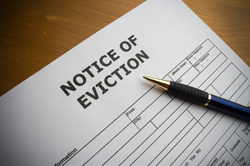
First, the tenant might not show up, and the landlord will win by default. That means that the landlord can get the Writ of Recovery immediately. The Writ of Recovery is an order from the court which tells the sheriff to remove the tenant from the property
The second option is that the landlord and tenant might be able to work out a settlement agreement, whereby the tenant either agrees to pay up or move out within a certain period of time. I recommend that the landlord give the tenant as little time as possible to comply. The judge could give the tenant up to seven days, and I generally recommend not giving the tenant longer than seven days, although it is probably okay to go out longer if the landlord so wishes. Still, I would probably not go out longer than 30 days, unless the landlord wants to be very generous.
The third option is that the tenant shows up, but the landlord and tenant are not able to agree on a settlement of the dispute. However, if the judge finds or the tenant admits that the tenant has violated the lease either by not paying rent, by staying beyond the date allowed in the lease, or in some other way, the judge might find for the landlord anyway. In this case, the judge can stay the writ of recovery for up to seven days if there is a finding of undue hardship, which usually means that the tenant either has young children or an obvious physical disability
The fourth option is that the tenant might request a trial. If the landlord has brought the eviction only because the tenant has not paid rent, then the landlord should request that trial be conditioned on the tenants paying the unpaid rent into the court. In other words, the tenant will not get a trial on the issue of unpaid rent unless the tenant has paid amount of unpaid rent into court. However, if the landlord has brought the eviction also because the tenant has not paid rent and for some other reason, then the tenant can get a trial with out having to deposit the unpaid rent into court
For this reason, I always ask the landlord what they want to happen at the hearing. If the landlord just wants the tenant to move out and be gone, then it makes sense to bring the eviction action for unpaid rent and for any other lease violation or violations, even if that means the tenant can get a trial without depositing the unpaid rent into court. However, if the landlord just wants the tenant to get caught up, then I generally recommend that the landlord bring an eviction action only for unpaid rent, and for no other reason, even if there are other lease violations. In so doing, the landlord hopes that the tenant will realize that the landlord is serious about rent, and will evict the tenant if the rent is not paid. In other words, by bringing the eviction, the landlord wants the tenant to realize that the landlord means business.
Every landlord – tenant situation is unique, and I recommend that landlords talk to an attorney experienced in evictions and landlord tenant law before taking action To that end, I invite landlords to give me a call at 763-450-9494 to discuss their unique situation.
WARNING: The information contained in this blog post does not constitute legal advice and may not be applicable to your situation. Tim is licensed to practice law only in Minnesota, and the information contained in this blog post may not apply to jurisdictions outside of Minnesota. Further, reading this blog post does not create an attorney-client relationship between you and Baland Law Office, P.L.L.C. You should always discuss your situation with an attorney before taking any action based on what you may read in this blog. To that end, please call (763) 450-9494 to set up an appointment to discuss your situation.
 RSS Feed
RSS Feed